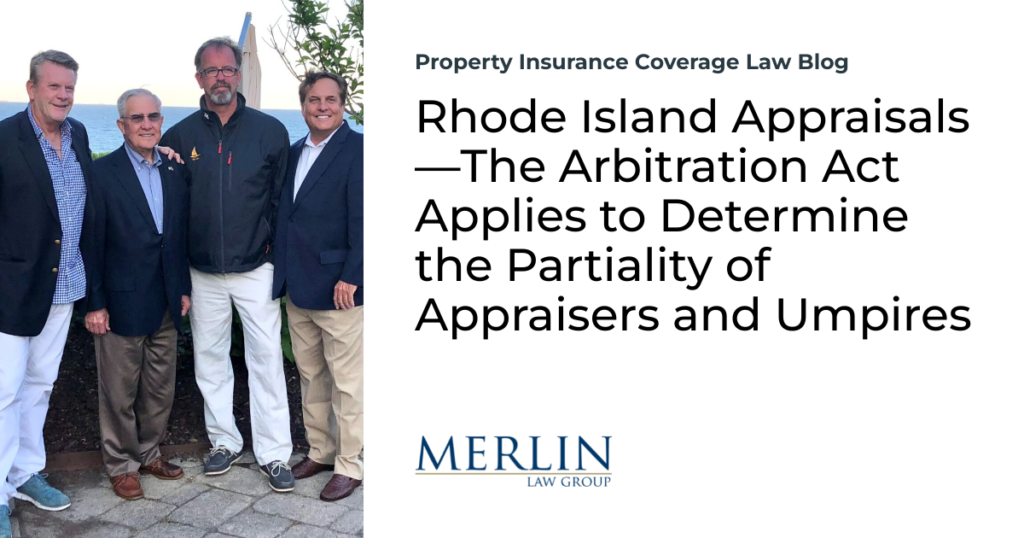Rhode Island Appraisals—The Arbitration Act Applies to Determine the Partiality of Appraisers and Umpires

Yesterday’s post, Should Appraisers Be Advocates For A Party To An Appraisal?,noted the importance for insurance appraisal participants to first determine what state law applies. A clear example of this important point is the post, Appraisal Is Not Governed Under Arbitration Rules in Utah, where Utah directly holds that appraisal is not arbitration and the Utah Arbitration Act does not apply to an insurance appraisal. Contrary to that view, Rhode Island directly finds that its arbitration laws apply to insurance loss appraisals.
In a recent Rhode Island case determining whether the insurer’s appointed appraiser and the umpire were biased and partial to the insurance company, the parties and the court agreed that Rhode Island insurance appraisals were governed under Rhode Island’s arbitration laws:
BRS’ appraisal challenge and breach of contract claim largely turn on the issue of whether Defendants’ appraiser and the umpire were impartial and competent. Rhode Island courts have held that a party seeking to challenge an appraisal award must establish ‘a reasonable impression of partiality.’…This showing requires ‘more than an appearance of bias but less than actual bias.’….Meaning, ‘a reasonable person would have to conclude that an arbitrator was partial to one party to the arbitration.’…Plaintiff also must establish a causal nexus ‘between the party-appointed arbitrator’s improper conduct and the award ultimately decided upon.’…While these cases use the ‘arbitrator’ language, the appraisal process constitutes arbitration under Rhode Island law. Waradzin v. Aetna Cas. and Sur. Co., 570 A.2d 649, 650 (R.I. 1990).
Rhode Island applies its arbitration laws to insurance appraisal, and Utah does not apply arbitration rules. Merlin Law Group attorneys and I practice property insurance law throughout the United States. These differences between state laws do not mean one is right and the other wrong. It does mean that how a property insurance loss is analyzed and then handled for policyholders may be different. Treating all losses the same without considering the impact of state laws is a bad practice.
Regarding the alleged bias of the insurance company’s appointed appraiser, the judge noted:
BRS contends that a person reasonably would not believe that the engineer-appraiser was impartial due to his work for Defendants on this insurance claim (and other insurance claims).BRS also suggests that the appraisal process was biased because the engineer-appraiser’s submission to the umpire ultimately matched the previous estimates that he had quoted to Defendants. An error in the initial appraisal award required the issuance of an amended award. In fact, this error required the engineer-appraiser to recalculate his valuation, which was ultimately adopted in the amended award. Accordingly, both appraisal awards exactly matched both estimates that the engineer-appraiser had quoted.
While the engineer-appraiser’s previous work for insurance companies raised an appearance of impartiality, this fact alone suggests nothing further. For example, an expert economist might provide economic analysis on behalf of only patent holders. But this trend might result from the fact that her valuation methodology tends to yield higher damages numbers than other methodologies, and thus putative patent infringers would hesitate to retain her. It would be peculiar to suggest that such an expert is biased (in the non-statistical sense of the word) toward the patent holder she is representing because the methodology that she believes is most accurate tends to generally favor patent holders in litigation. To be sure, the expert might select this methodology just because she has a policy preference for strong remedies for patent holders (or even this patent holder). In that case, the expert’s bias—and not her sincerely held belief on which methodology is most accurate—drives the outcome. Yet this latter hypothetical turns on additional facts beyond an expert’s working for one type of client. Alternatively, patent holders may have hired this expert on a recommendation or for some other reason, and once she started to work consistently for patent holders, putative patent infringers became hesitant to hire her. All sorts of reasons exist for a consultant to work for only, or primarily, one type of client. Because not all these reasons represent bias, facts beyond those here are required to make such a determination. The engineer-appraiser’s work for insurance companies thus demonstrates no more than an appearance of bias.
The judge further required the policyholder to show that there is a link between the bias and a lower appraisal award:
Lastly, BRS must show that there was a causal nexus between the bias and the appraisal award…To say that the engineer-appraiser was biased and that the appraisal award favored Defendants remains insufficient. Assuming that the engineer-appraiser was biased, BRS must demonstrate that this bias caused the lower appraisal award on which a majority of the panel ultimately voted.
Ultimately, the judge ruled for the insurance company indicating that the facts did not demonstrate enough merit for the matter to go before a jury on the issue of bias.
While the circumstances of the appraisal process might be consistent with a finding of bias, they do not in themselves demonstrate more than an appearance of bias. BRS also asks for an overly rigid definition of competence without adequate authority. As the Rhode Island Supreme Court has stated, ‘[t]he parties to an arbitration have agreed to settle their dispute without a judge; judicial economy dictates that our interference be limited to [appropriate] instances.’ McGinity, 899 A.2d at 509. BRS has not adduced enough facts to justify such interference.
If you have further interest in Rhode Island insurance appraisal law, I would suggest you read What Property Insurance Claims Can Go To Appraisal In Rhode Island? and How Long Is Too Long To Demand Appraisal?
Thought For The Day
Take advantage of every opportunity to practice your communication skills so that when important occasions arise, you will have the gift, the style, the sharpness, the clarity, and the emotions to affect other people.
—Jim Rohn
1 BRS Real Estate v. Certain Underwriters at Lloyds, London, No. 1:20-cv-00228 (D. R.I. July 18, 2023).







